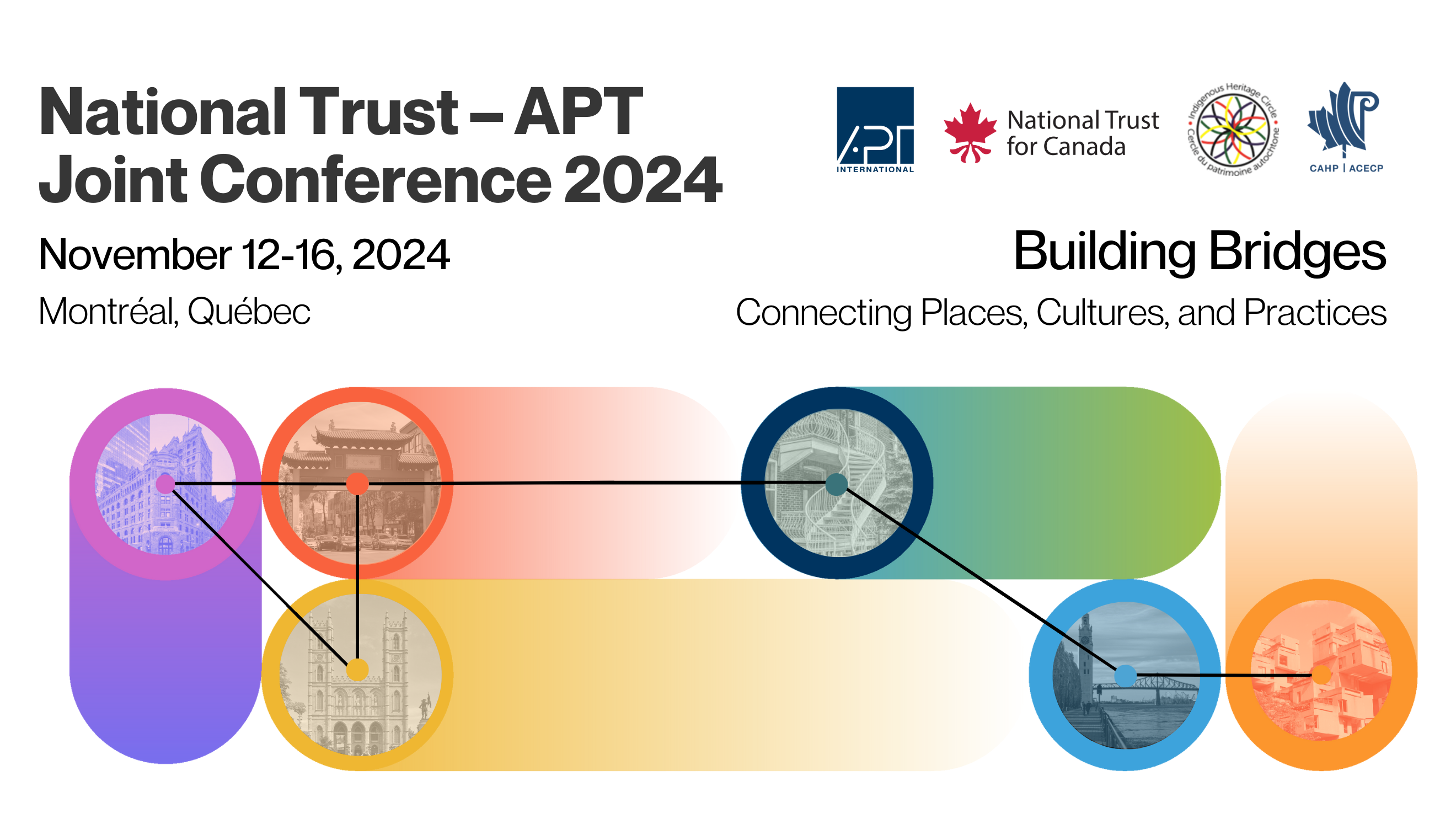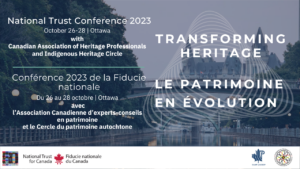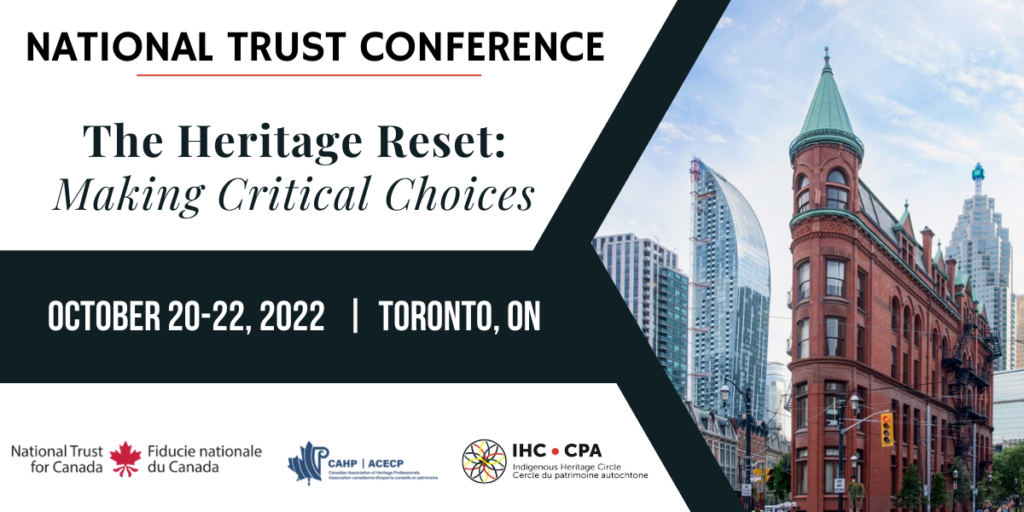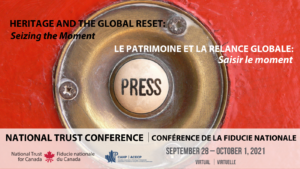Past Conferences
Held every year since 1974, the National Trust Conference brings together a wide-range of people working to keep Canada’s heritage alive: from grassroots activists and elected officials, to professionals, planners, policy makers, and property owners. Conference themes have tackled pressing issues for Canada’s heritage movement, including community revitalization, heritage tourism, sustainable development, and climate change.
Do you have questions about our current or past conferences? Contact us today 613-237-1066 ext. 227 / cwiebe@nationaltrustcanada.ca.
National Trust- APT Joint Conference 2024: Building Bridges (with Canadian Association of Heritage Professionals and Indigenous Heritage Circle)
Conference Website: Click Here
Full Printed Conference Program: Click Here
Building on joint conferences in Ottawa 2017 and Edmonton 2020, the Association for Preservation Technology (APT), National Trust for Canada, Canadian Association of Heritage Professionals (CAHP), and Indigenous Heritage Circle (IHC) joined forces once again to present a major international heritage conservation conference. We were thrilled to welcome almost 1,200 participants to Montreal for 5 busy days of learning and networking.
NATIONAL TRUST 50th ANNIVERSARY CONFERENCE 2023
(with Canadian Association of Heritage Professionals and Indigenous Heritage Circle)
Transforming Heritage
October 26–28, 2023
Ottawa, Ontario
Conference Session Schedule: Click here
Conference Website: Click here
Sponsorship opportunities: Click here
Canada’s heritage conservation movement is transforming itself to meet new needs in society. Are you on board? Advancing decolonization and anti-racism, leading climate action, and supporting the efforts of grassroots organizations, governments, and the private sector and to address socio-economic challenges are front and centre in our communities. At this watershed moment, the heritage sector has the opportunity to accelerate our benefit to society through transformational changes to our mission and practice, based on a shared vision.
The National Trust’s 50th anniversary conference is a fitting heritage milestone to seize on lessons from the movement’s many dramatic or gradual transformations over time as a compass for the future. Together, how will we shape the next 50 years, addressing pressing issues like reconciliation, affordable housing, accessibility, climate change, social justice, and economic resiliency?
Take a look at some of the highlights from our 50th anniversary conference, held in Ottawa ON in October 2023

Heritage and the Global Reset: Making Critical Choices
October 20-22 2022
Toronto, Ontario
Conference Session Schedule At-A-Glance
Seismic societal shifts exacerbated by a global pandemic have drawn into question many values, structures, and public policies in Canada, including those guiding heritage conservation. As the urgency increases to advance decolonization and anti-racism, take bold climate action, and redress economic and social inequity, are heritage principles and heritage places in step, or stuck in the past? Now is the time for realignment and concerted action. How can we accelerate the heritage movement’s impact as a positive, essential, progressive force addressing pressing issues like climate change, racism, reconciliation, affordable housing, social justice, accessibility, economic resiliency, and more?
Be Part of the Heritage Reset – Raise your voice in “reset” working sessions as we reinvigorate the Canadian heritage vision, and get inspired by reboot efforts underway in the United States and Australia. Review the Heritage Reset Framework here.
Heritage and the Global Reset: Seizing the Moment
September 28 – October 1 2021
Virtual Conference
Conference Session Schedule At-A-Glance
Conference Website. Click here
Sponsorship opportunities. Click here
Be Part of the Heritage Reset – Raise your voice in “reset” working sessions as we reinvigorate the Canadian heritage vision, and get inspired by reboot efforts underway in the United States and Australia. Review the Heritage Reset Framework here.
APT – NATIONAL TRUST JOINT CONFERENCE 2020 (in association with CAHP)

Hindsight 2020: Conservation, Disruption and the Future of Heritage
October 1-7, 2020
Edmonton, Alberta
CONFERENCE PROGRAM & SPONSORS: Click Here
Building on the success of Ottawa 2017, the Association for Preservation Technology International (APT) and the National Trust for Canada (in association with the Canadian Association of Heritage Professionals (CAHP)) collaborated once again to present a virtual heritage and preservation conference October 1-7, 2020 rooted in Edmonton, Alberta. Over 875, architects, engineers, volunteers, policymakers and planners joined us from Canada, the United States, Latin America, Europe, and beyond to share new approaches to the protection and renewal of heritage places.
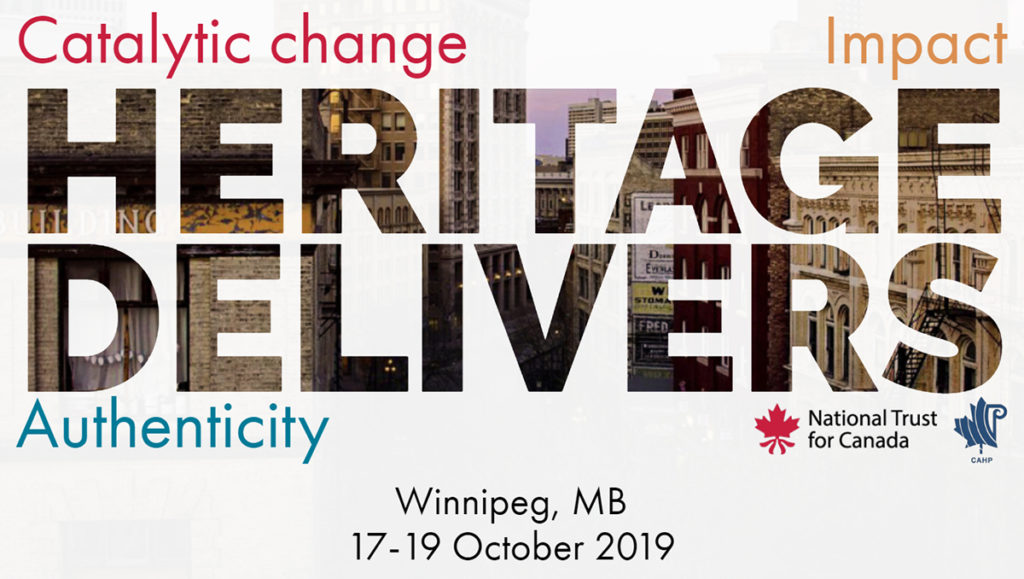
Heritage Delivers: Impact, Authenticity, and Catalytic Change
in association with the Canadian Association of Heritage Professionals
October 17-19, 2019
Winnipeg, Manitoba
Selected Presentations from the Conference
Canadian Heritage Funding – An Introduction to Three Programs
National Trust Conference 2019 explored the catalytic power of historic places and how they are essential to building vibrant and diverse communities, and sustainable economies.
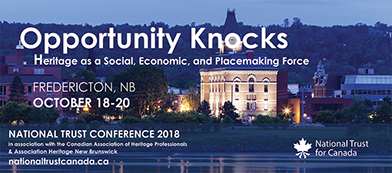
Opportunity Knocks: Heritage as a Social, Economic, and Placemaking Force
in association with the Canadian Association of Heritage Professionals & Association Heritage New Brunswick
October 18-20, 2018
Fredericton, New Brunswick
The 2018 National Trust Conference headed to Fredericton to explore the theme of Opportunity Knocks: Heritage as a Social, Economic, and Placemaking Force. The conference explored the transformative power of heritage to help turn places around, galvanize communities, and create fresh options. Bringing together the cutting-edge of heritage thought and practice, in Canada and abroad, the conference emphasized inter-disciplinary insights on such diverse topics as heritage-led development, sustainability, museum/historic site regeneration, and Indigenous heritage
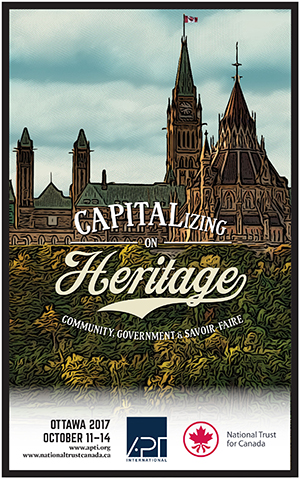
CAPITALizing on Heritage
National Trust and APT Conference held in association with the Canadian Association of Heritage Professionals
October 11-14, 2017
Ottawa, Ontario
Ottawa was the place to be for Canadian Confederation’s 150th anniversary celebrations. Embracing the historic opportunity, the Association for Preservation Technology International and the National Trust for Canada joined forces to create CAPITALizing on HERITAGE, the largest gathering of conservation practitioners and advocates ever mounted in Canada.
Ottawa is a veritable heritage hub: the ancestral territory of the Algonquin Anishinabeg; a logging town at the confluence of three rivers, transformed to serve as the seat of Canada’s national government; and a modern research, academic and high tech hot spot, alive with innovative conservation, construction and development projects led by both “Town & Crown,” private and public sectors. The conference capitalized on this rich blend of history, place, ritual and expertise.
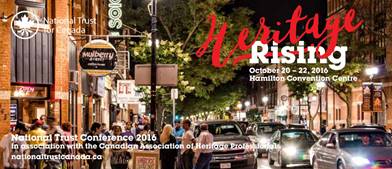
Heritage Rising
in association with the Canadian Association of Heritage Professionals
October 20-22, 2016
Hamilton, Ontario
Heritage places are rising stars. They have an authenticity and vibrancy that can’t be purchased off-the-rack and they sit at the intersection of defining issues of our time – how to live sustainably and equitably.
National Trust Conference 2016, Heritage Rising, was inspired by Hamilton, a resilient city with an exceptional heritage legacy that has bounced back from the decline of its industrial sector. It now boasts one of Canada’s fastest growing economies. Propelled by a growing creative sector and a blend of grassroots and public projects, heritage-led regeneration is transforming the city’s urban fabric and creating a dynamic new civic identity.
Heritage Rising explored the cutting-edge of heritage thought and practice, in Canada and abroad, including Indigenous heritage, rural revitalization and climate change. It also built on Hamilton’s experience to examine how heritage reflects cultural diversity and contributes to social goals like poverty reduction, food security and public health.
GOING BEYOND CONSULTATION – HAMILTON INDIGENOUS HERITAGE ROUNDTABLE 2016
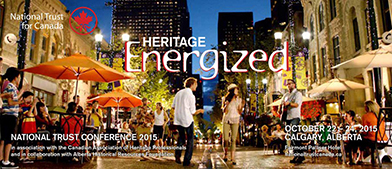
Heritage Energized
in association with the Canadian Association of Heritage Professionals and in collaboration with Alberta Historical Resources Foundation
October 22-24, 2015
Calgary, Alberta
Heritage is an energy producer that consistently infuses Canadian communities with cultural and economic vitality, sparks new investment, and grounds us with a strong sense of place. The 2015 National Trust Conference explored how heritage energy can turn places around, empower people, and create opportunities. It also shined a spotlight on how the heritage movement itself is being transformed through its evolving relationship with property development, arts and culture, sustainable living, philanthropy, and the cultural diversity of Canada.
MOH-KINS-TSIS: CALGARY INDIGENOUS HERITAGE ROUNDTABLE 2015
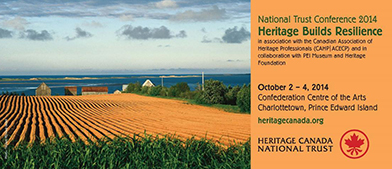
Heritage Builds Resilience
in association with the Canadian Association of Heritage Professionals and in collaboration with PEI Museum and Heritage Foundation
October 2-4, 2014
Charlottetown, PEI
Heritage builds resilience by rooting identity and sense of place, acting as a catalyst for economic and social regeneration, inspiring imaginative new development, and ensuring sustainability through the reuse of existing infrastructure and the ability to recover from natural disaster or neglect. Inspired by the 150th anniversary of the historic Charlottetown Conference, the National Trust Conference 2014 explored how heritage builds resilient Canadian communities that can adapt creatively and collaboratively to change.
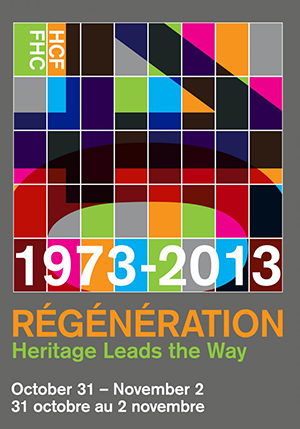
REGENERATION: Heritage Leads the Way
in association with the Canadian Association of Heritage Professionals
October 31-November 2, 2013
Ottawa, Ontario
Canada’s heritage conservation movement had made great strides in the last 40 years. It was being challenged to respond to the changes taking place in Canadian society, culture, and economy: from the shift to smaller government and the drive for sustainable communities, to an emphasis on new conservation strategies and legislative tools. We are a diverse community and a new vision for heritage is emerging that will contribute to a new age in Canada. How is heritage being renewed and reinterpreted across the country?
HCF’s 40th Anniversary National Heritage Conference explored how older communities, cultural landscapes, buildings and intangible heritage are finding new relevance at this watershed moment.
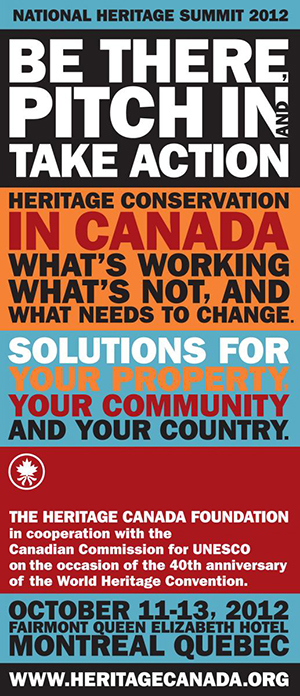
Heritage Conservation in Canada: What’s Working and What Needs to Change
in cooperation with the Canadian Commission for UNESCO, Canadian Association of Heritage Professionals, Canadian Forum for Public Research on Heritage, and Canada Research Chair on Built Heritage
October 11-13, 2012
Montréal, Québec
Be There, Pitch In and Take Action!
2012 marked the 40th anniversary of the World Heritage Convention, a landmark agreement that set national benchmarks for heritage management. What better time to reflect on how far we’ve come as a movement, where we are now, and determine where we need to go. While economic circumstances and government priorities are changing dramatically, built, cultural and natural heritage is being embraced by increasing numbers of Canadians, many of whom do not self-identify as heritage supporters. The National Heritage Summit was an opportunity to take stock, “hit the reset button,” and set priorities for putting heritage on the local, provincial and national agenda.
To improve our ability to build vibrant communities and protect places that matter, we need to capitalize on our collective strength, and foster stronger working relationships with other sectors and new partners. We must also re-establish the social and economic relevance of heritage conservation for a new era and the next generation.
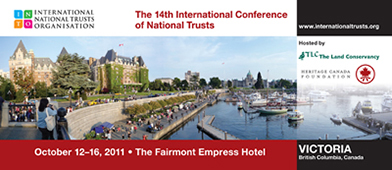
14th INTO International Conference of National Trusts
Co-hosted by Heritage Canada Foundation (HCF) and The Land Conservancy of British Columbia (TLC)
October 12-16 2011
Victoria, British Columbia
Connecting People, Places and Stories: New Strategies for Conservation in a Changing World.
The 14th International Conference of National Trusts focused on building connections and sharing experiences to help organizations, communities and individuals charged with caring for special places meet the new challenges and opportunities of the 21st century. Conference sessions explored new approaches to the protection of special places as well as the stories, traditions, languages and cultures that give them meaning. A key conference goal was to identify innovative ways to successfully engage people and communities in this work.
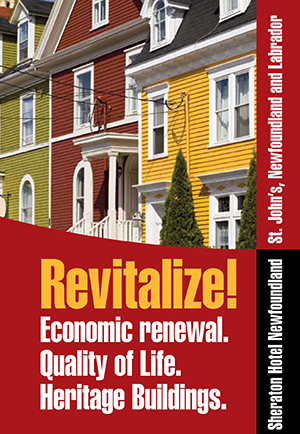
REVITALIZE! Economic renewal. Quality of Life. Heritage Buildings.
in cooperation with the Canadian Association of Heritage Professionals
September 30-October 2, 2010
St. John’s, Newfoundland
Cultivating collaborative solutions for a vibrant future
The 2010 Heritage Canada Foundation conference examined how capitalizing on heritage buildings can play a leading role in revitalizing Canadian communities large and small, urban and rural. The focus was on collaborative and innovative strategies to set heritage-centered renewal in motion and ensure its long-term sustainability.
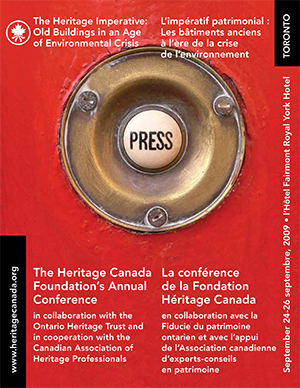
The Heritage Imperative: Old Buildings in an Age of Environmental Crisis
in collaboration with the Ontario Heritage Trust and in cooperation with the Canadian Association of Heritage Professionals
September 24-26, 2009
Toronto, Ontario
Climate change. Green building. Economic renewal. Older buildings have answers for the biggest questions of our generation
The 2009 Heritage Canada Foundation conference brought together delegates and speakers from the fields of heritage preservation, environmental conservation and green building to explore these themes. Delegates discovered how the rehabilitation and re-use of older buildings and existing neighbourhoods can help save the planet – and how the green movement and architectural conservation will become more integrated in the process.
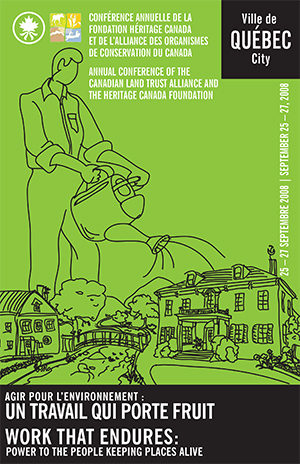
Work That Endures: Power to the People Keeping Places Alive
Heritage Canada Foundation and Canadian Land Trust Alliance Annual Conference
September 25-27, 2008
Québec City, Québec
This milestone conference, brought together for the first the Canadian Land Trust Alliance and the Heritage Canada Foundation, was designed to inform, empower and connect the ‘force’ – the people who make their living or volunteer their time researching, restoring, adapting, maintaining and interpreting our heritage places.
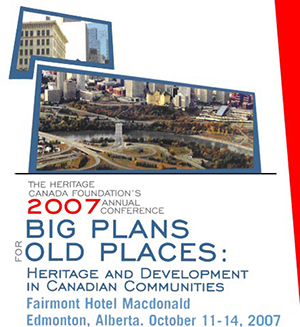
Big Plans Old Places: Heritage and Development in Canadian Communities
October 11-15, 2007
Edmonton, Alberta
The Heritage Canada Foundation believes that historic places – rural landscapes, traditional housing and commercial districts as well as monuments and historic sites – are an integral part of memory, community and identity. The 2007 conference set the stage for a national conversation about protecting and sustaining the historic built environment.
Headlines, Hotlinks and Historic Places: Heritage in an Electronic Age
In partnership with Public Works and Government Services Canada
October 12-14, 2006
Ottawa, Ontario
Ottawa’s old train-station-turned-conference-centre was the site of our annual conference. The three-day event focused on new technologies for sharing information and raising public awareness of conservation issues. They included the digital reconstruction of buildings, creation and management of inventories and registers, rehabilitation project management, practical information on promoting conservation through web and internet communications, and how to work with the media.
Heritage Conservation and Sustainable Development
in cooperation with the Canadian Commission for UNESCO, Canadian Association of Heritage Professionals, Canadian Forum for Public Research on Heritage, and Canada Research Chair on Built Heritage
September 15-17, 2005
Regina, Saskatchewan
Sustainable development has become a touchstone for government at all levels in Canada and abroad. During the past 30 years, the environmental movement has had a major impact on the way we live and perceive our surroundings. From blue box recycling to the concept and practice of environmental assessment, from the handling of toxic waste to encouraging energy-efficient building practices, sustainability is part of daily life. The conservation of heritage property, however, is not well recognized as a key part of sustainable development. Topics covered were: embodied energy in heritage buildings, rehabilitating heritage buildings for energy efficiency and urban ecology.

